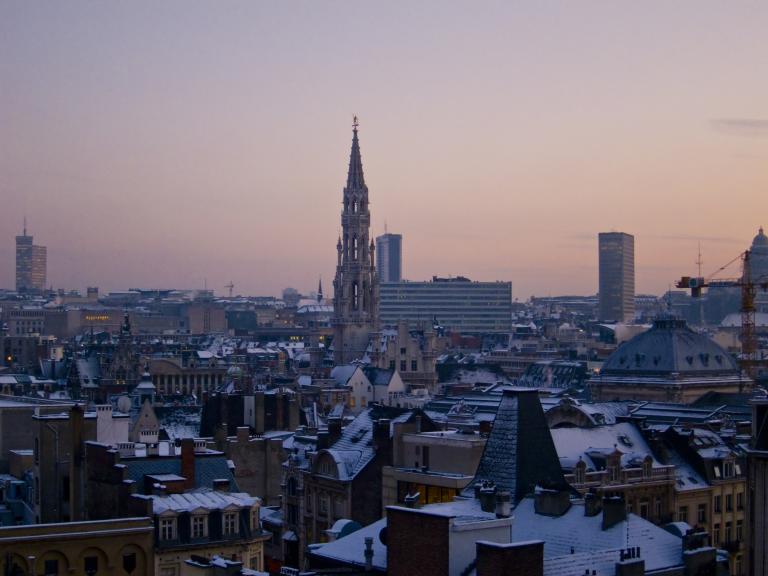
(Wikimedia Commons)
We don’t yet know — at least, I don’t — who is behind the horrific attacks in Brussels, Belgium. (The fact that three LDS missionaries were among the wounded will bring this event closer to home for many of my readers.)
It’s virtually certain, though, that they were carried out by Islamists. And that’s even without the report that I heard just a few minutes ago, which indicated that Arabic-sounding shouts were heard just before the two bombs exploded at the airport.
In fact, it seems highly likely that this was an ISIS operation, or, at least, an effort carried out by an ISIS affiliate or wannabe.
In the light of those assumptions, some very preliminary thoughts:
- We’re plainly playing catch-up. We’re on the defensive. We’re swatting at bees, while the hive from which they came — the Syrian town of Raqqa, which is the capital of the self-proclaimed “Islamic State,” where the self-proclaimed Islamic caliph Abu Bakr al-Baghdadi holds court — remains relatively untouched.
- ISIS operatives are using this safe haven not only for planning attacks, but for creating sophisticated recruitment videos and working on more effective weapons (including the apparent production of chemical agents and the retrofitting of rockets in order to bring down passenger airliners and military planes). And they do so in relative peace and quiet, undisturbed.
- The incoming commander of CENTCOM, which is responsible for the Middle East, acknowledged in congressional testimony just a few days ago that we have no strategy for destroying the seat of the so-called “caliphate” in Raqqa.
- “Carpet-bombing” Raqqa and other ISIS targets, which some candidates have advocated, isn’t even remotely a good idea. Most of the people even in Raqqa itself are innocent civilians, suffering under the tyrannous thumb of an arbitrary and incredibly cruel occupation force. They are victims just as much as are those killed and wounded in Paris and Brussels and in San Bernardino and on that Russian airliner that ISIS brought down.
- It seems likely to me that one of the immediate political upshots of this event will be at least a slight uptick in support for Donald Trump. People often turn to a perceived Strong Leader in times of fear and uncertainty — and, yes, I do very much have Hitler and Mussolini in mind on this point. But I’m absolutely certain that his election would be a foreign policy disaster for the United States, and that it would constitute a major obstacle for our efforts in the Middle East.
- I can certainly understand calls to block Middle Eastern refugees at our border. And I fully grasp the fact that we’re not equipped to vet those seeking to enter our country. This is a major challenge, and a moral dilemma. Blocking Muslims at the border, however, will not work. First of all, it’s blatantly unconstitutional. Our government isn’t permitted to discriminate between theologies. Secondly, it would be an absurdly blunt instrument that would offend our friends — will the kings of Saudi Arabia and Jordan be barred from entering our country? will their sons and grandsons be banned from studying at our universities? — and that would keep Muslim neurosurgeons based in Toronto from attending medical conventions in New York. Third, it wouldn’t keep our enemies out: How in the world are we going to distinguish Muslim Syrians from Christian Syrians? It’s already been reported that ISIS has instructed some of its people to wear crucifixes. Does anybody really imagine that, if asked at the airport immigration counter “Are you a Muslim?” an ISIS agent is going to respond “D’ohhh. I was hoping you wouldn’t ask that question. Yes, I am,” and then sheepishly leave the line for a return flight? A constitutionally-permissible option, of course, would be to bar (or, at least, to slow down) entry into the United States from certain nations where we have concerns (e.g., Syria). Such an option can be discussed. The idea of banning Muslims as such is a non-starter.
Finally, let me just say that, to me, one of the terrible things about the rise of Islamist terrorism has been its destruction of the public image of Islam.
I’ve spent much of my life reading, writing, and teaching about Islamic culture and civilization — about great thinkers such as al-Ghazali, Ibn Khaldun, al-Kirmani, al-Biruni, Ibn al-Haytham, Ibn Battuta, al-Khwarizmi, Avicenna [Ibn Sina], Ibn Tufayl, al-Farabi, Averroës [Ibn Rushd], and al-Tabari, and great literary figures such as Rumi, Nizami, al-‘Attar, Ibn al-Muqaffa’, Abu Nuwas, Omar Khayyam, It pains me deeply to see so great a human tradition reduced in the eyes of many to a hateful, nihilistic, and poisonous ideology that seems to delight in the violent and bloody murder of innocents. If I were a Muslim, I don’t know how I could endure the sorrow of what has been done to the good name of my faith.











